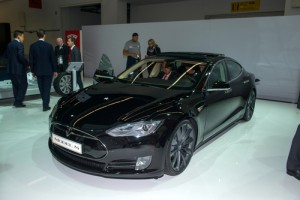Earlier this week, the government announced the elements of its £500 million package to promote ‘ultra low emission vehicles’ (ULEVs), by which it mostly means electric cars. They will continue to subsidise EVs by £5,000 each, will spend £100 million on R&D, £32 million on infrastructure like rapid chargers, and £20 million on ULEV taxis, amongst other things.
£500 million is a lot of money, but is it worth it, and is it enough to make EVs mainstream?
Well, as for whether it’s worth it, the government estimates the ULEV industry is worth £11.2 billion to the economy. I’ve no idea how that figure is arrived at, but I’ve been attending a lot of automotive events recently, and there’s no doubt that the global car industry is serious about EVs. And I think it’s fair to say that the UK has the engineering expertise to make it a major player.
A few years ago I was involved in a government funded programme to test EVs on the road. I worked with four UK sports car makers who were developing electric sportscars – the idea was to show what an electric car could do, and dispel the ‘milk float’ image. The great thing was that the market for sports cars is not so price sensitive, and has a lot of enthusiasts who want new toys, so these guys could develop vehicles with the latest motors, batteries etc and really show off the engineering.
None of those cars has made it into significant production, but that wasn’t the point. They showed that the UK has loads of engineering talent, they developed the state of the art, and they blew the socks off anyone who drove them! Fast forward three years, and in 2014 we have a couple of really interesting developments – on the track the FIA’s ‘Formula E’ series is finally happening in a big way, and on the road, the Tesla S is pushing the boundaries of what an EV can do.
A few weeks ago, I finally got the opportunity to drive a Tesla S (on a sunny day around the Silverstone track, doesn’t get better than that). This is a car with a 300 mile range, luggage space under the bonnet as well as in the back, and an option to have a couple of extra (foldaway) seats in the boot so you can seat seven people in it – so a pretty practical family car. However, it’ll do 0-60 mph in 4.2 seconds and beat an Aston Martin Rapide in a drag race – at Silverstone I flew effortlessly past all the other cars on the track. Tesla basically can’t make them fast enough, with every car so far pre-sold.
Tesla’s success brings me neatly back to the second question about the government’s £500 million plan to get us all driving EVs – is it enough? In Norway, in March, the Tesla S broke the all-time record for sales of any one model of car in any one month, getting 10.8% of all new car sales. And EVs in general got 20.3% of new car sales, with the Nissan Leaf and BMW i3 doing well too. That’s mainstream, so how did they do it? Well, they tax car sales heavily, but have zero tax for EVs, plus EVs are exempt from congestion charging in a number of cities, get free parking and free charging at a network of fast chargers all over the country.
So will the UK emulate Norway? Probably not just yet. Yes, we’re building a fast charge network, but the UK has more drivers and more roads to serve than Norway. Yes, EVs are exempt from the London congestion charge, but we really need to see congestion charging in a lot more places, and that’s proved politically challenging. But the real stumbling block is still price. GDP per capita is about 50% higher in Norway than the UK, meaning a lot more disposable income – allowing an £80,000 car like the Tesla S to top the sales charts.
Is this £500 million well spent? Spending money to create jobs is always a gamble by government, but if that’s the goal, I think the ULEV industry is a better bet than most. Is that money going to help us address our transport problems, especially climate change? Well, in the long term it will be part of the picture, but only if we get on with the other stuff that needs to happen right now, like building more renewable electricity capacity, changing travel behaviour and looking into other fuels for the vehicles we can’t run on electricity. I’m still waiting for equally serious commitments on those fronts…
Government announces £500m support package for ULEVs including Plug-in Car Grant extension:
Electric car breaks all sales records in Norway:
http://barentsobserver.com/en/business/2014/04/electric-car-breaks-all-sales-records-norway-03-04
Tesla Model S takes on the Aston Martin Rapide:
https://www.youtube.com/watch?v=JUW0l7bZn1s

